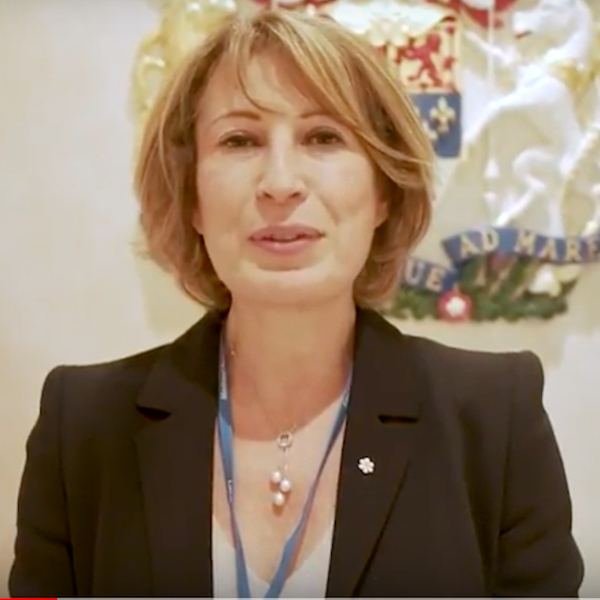Credible science vs incredible claims about aquaculture
Expert panel studying appropriate use of scientific evidence in decisions concerning aquaculture expected to deliver report in October. A federal expert panel on the appropriate use of scientific evidence in decisions concerning aquaculture is expected to deliver its report at the end of October, the office of Canada’s chief Science Advisor said today.
“The panel is progressing well with their report, but the final version likely will not be ready until the end of October…This has been discussed with and agreed upon by the Minister of Fisheries and Oceans,” a spokesman for Canada’s chief science advisor, Dr. Mona Nemer (pictured) told SeaWestNews.com
Some scientists with Canada’s Department of Fisheries and Oceans and anti-fish farm opponents have accused the government of working with industry to suppress findings that “show” marine aquaculture is detrimental to the survival of wild stocks.
One of the industry’s most vocal critics is Dr. Kristi Miller-Saunders, a Department of Fisheries and Oceans (DFO) scientist, who recently issued a controversial report on the adverse effects of the Piscine Reovirus (PRV) on wild salmon.
Using the study’s findings, which has been heavily criticized for being “speculative”, anti-salmon farming groups and The Pacific Salmon Foundation (PSF) are calling for an end to open-water salmon aquaculture in British Columbia.
Canada’s Centre for Science Advice (CSA), the BC Centre for Aquatic Health Sciences (BCCAHS), the University of British Columbia and Dr. Ian Gardner, Canada Excellence Research Chair in Aquatic Epidemiology, who is part of the Strategic Salmon Health Initiative have all criticized the study stating the findings are unsubstantiated.
Despite Dr. Miller-Saunders’ recent assertions the bottom line consensus from the aquaculture scientific community is that PRV is common but the fish on BC salmon farms are not sick. Much like humans, it’s normal that fish are naturally exposed to numerous viruses every day without adverse effect.
“Our government understands that Canadians have real concerns around aquaculture. We look forward to the recommendations of the panel led by the Chief Science Advisor on how science can be better applied to decision making and communicated to the public in support of sustainable aquaculture as we seek to remain a strong, science-based regulator of the aquaculture industry,” said Dominic LeBlanc, the former Minister of Fisheries, Oceans and the Canadian Coast Guard, when he announced the formation of the expert panel.
Canada’s seafood farmers have welcomed the new federal review of science-based decision-making in aquaculture.
“Any efforts to increase engagement with Canadians and to develop trust and understanding of the science are welcomed,” said Timothy Kennedy, Executive Director of the Canadian Aquaculture Industry Alliance (CAIA).
“With a supportive policy and regulatory environment, our industry is ready to expand dramatically, creating new middle class jobs and growing our economy,” added Kennedy, whose organization’s members generate over $5 billion in economic activity, over $2 billion in GDP, and employ over 25,000 Canadians.
In addition to the appropriate use of scientific evidence in decisions concerning aquaculture, the expert panel will also recommend the transparent and effective public communication of the underlying scientific evidence and rationale for policy and regulatory decisions related to impacts on the marine environment.
The panel is comprised of the following;
Dr. Julia Baum, associate professor of Biology at the University of Victoria;
Dr. Alejandro Buschmann, professor at the Universidad de Los Lagos and a senior researcher from the Center of Biotechnology and Bioengineering (CeBiB) and i-mar Research Center (i-mar) in Chile;
Dr. Tony Farrell, professor of Zoology at the University of British Columbia and a fellow of the Royal Society of Canada;
Dr. Susanna Fuller, a senior program officer at Oceans North and a Senior Research Fellow at the International Oceans Institute Canada;
Dr. Larry Hammell, dean (interim) of the UPEI Faculty of Graduate Studies, and professor and associate dean (Graduate Studies and Research) at the Atlantic Veterinary College, University of Prince Edward Island;
Dr. Kjetil Hindar, research director at the Norwegian Institute for Nature Research (NINA) in Trondheim, Norway;
Heather Jones, chief executive of the Scottish Aquaculture Innovation Centre (SAIC);
Dr. Douglas Lipton, senior research scientist for Economics at NOAA Fisheries (National Marine Fisheries Service);
Dr. Matt Rise, professor in the Department of Ocean Sciences at Memorial University;
Dr. Sm’hayetsk Teresa Ryan, postdoctoral teaching and research fellow in the Department of Forest and Conservation Sciences, University of British Columbia,
Dr. Sandra Shumway, research professor of Marine Science at the University of Connecticut, and
Dr. Jamey Smith, executive director of the Huntsman Marine Science Centre.
To read their full bios go here
Related links
Fact checking Fin on Alaskan salmon ranching
Aquaculture Alaska hatchery pink salmon imperil wild stocks

